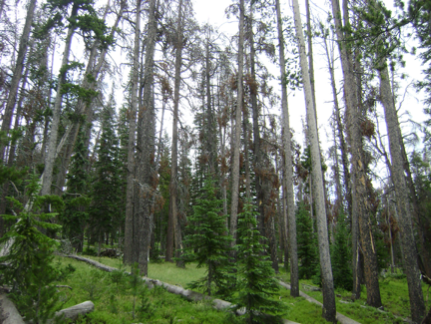From the Rocky Mountain Research Station:
Mountain pine beetles (MPB) are a constant presence in the Rocky Mountain Region, with a long history of periodic outbreaks. The latest beetle epidemic, which lasted from the late 1990s until about 2012, was particularly impactful in Colorado, where an estimated 800 million lodgepole and ponderosa pine trees were killed. However, as José Negrón, a research entomologist with the Rocky Mountain Research Station, explains, “It’s generally seen as negative, but as part of this research summary we wanted to show that there have also been positive aspects of the epidemic.”

